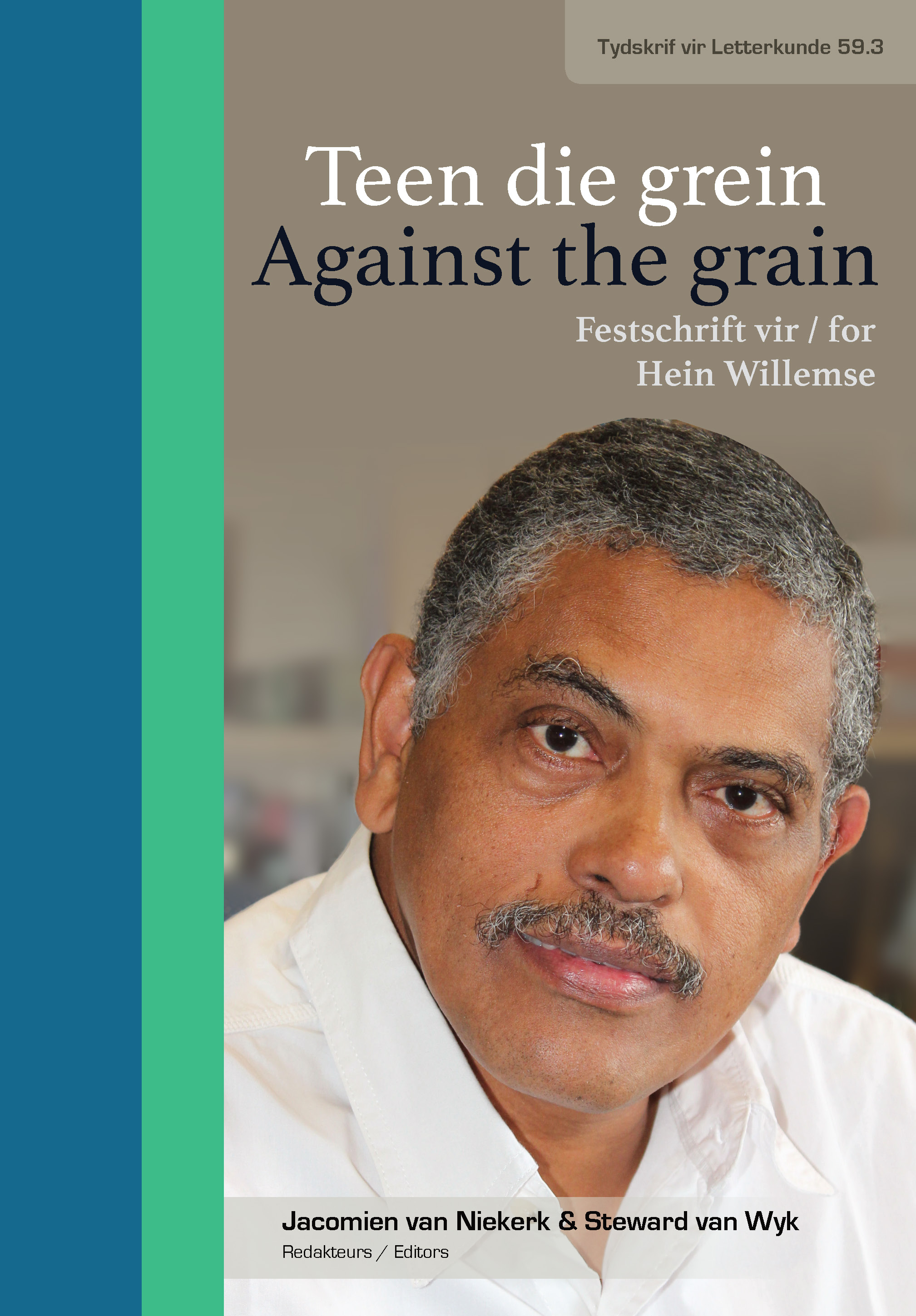Quelques nouvelles perspectives sur le soulèvement de Soweto : Le poème de H. M. L. Lentsoane “Black Wednesday” (“Laboraro le lesoleso ”)
DOI :
https://doi.org/10.17159/tl.v59i3.12197Mots-clés :
H. M. L. Lentsoane, “ Laboraro le lesoleso ”, “ Black Wednesday ”, soulèvement de Soweto, poésie du mouvement de conscience noireRésumé
Le poème épique sur le soulèvement de Soweto, “Laboraro le lesoleso ”, écrit en sepedi (sotho du Nord) par H. M. L. Lentsoane n’a été que récemment traduit en anglais par Biki Lepota avec le titre “Black Wednesday” et publié dans l’anthologie Stitching a whirlwind (2018). Dans cet article, je suggère que, en écartant l’anglais, certains déplacements cruciaux par rapport à la majeure partie de la poésie de protestation écrite en anglais ont dû avoir lieu. Lentsoane veut s’adresser directement à ses collègues de langue maternelle et non à une oreille nationale ou plus largement africaine ou internationale. Il apparaît clairement qu’en déployant diverses stratégies fondées sur l’oralité, le poète parvient à apporter un nouveau matériel et de nouvelles approches aux textes créatifs de protestation des Noirs pendant les années d’apartheid, par exemple, une libération du contenu spécifique de l’apartheid concernant leur oppression, dont tous les locuteurs indigènes avaient une connaissance commune ; une adhésion à l’oralité en termes de présentation, de vocabulaire et de forme ; et un lien avec les ancêtres et une libération de la tentative d’atteindre la conscience des Blancs. Cela se manifeste dans la perspective particulière du poème et l’accent mis sur la narration, le récit, associé à une imagerie poétique viscérale et vivante de l’événement. Le poème saisit de manière évocatrice le déroulement des incidents tout en déplaçant l’attention vers une demande ancestrale de défendre la droiture dans un champ de justice universel.
Téléchargements
Références
Chapman, Michael, et al. “Literary historiography/Literatuurgeskiedskrywing.” Journal of Literary Studies vol. 13, no. 1–2, 1997, pp. 210–53. DOI: https://doi.org/10.1080/02564719708530168.
Coplan, David B. In the Time of Cannibals; The Word Music of South Africa’s Basotho Migrants. U P, 1994.
Field, Sean. “Oral Histories—the Art of the Possible.” African Oral Literature: functions in contemporary contexts, edited by Russell H. Kaschula. Ince, 2001, pp. 249–56.
Furniss, Graham. “Language, Truth and Rhetoric in the Constitution of Orality.” African Oral Literature—functions in contemporary contexts, edited by Russell H. Kaschula. Ince, 2001, pp. 191–203.
Gwala, Mafika Pascal . Collected Poems, edited by M. Langa & A. Sitas. South African History Online, 2016. https://www.sahistory.org.za/archive/collected-poems-mafika-pascal-gwala-edited-mandla-langa-and-ari-sitas.
Hall, Megan & Antjie Krog (eds). Stitching a Whirlwind: An Anthology of Southern African Poems and Translations. Africa Pulse Series. Oxford U P, 2018.
Hirson, Baruch. Year of Fire, Year of Ash. The Soweto Revolt: Roots of a Revolution? Zed, 1981.
Hofmeyr, Isabel. We Spend Our Years as a Tale that is Told. Witwatersrand U P, 1993.
Krog, Antjie. “Indigenous Texts, Rich Points and Pluriversal Sources of Knowledge: Siswana-sibomvana.” Language and Decoloniality in Higher Education, edited by Z. Bock & C. Stroud. Bloomsbury, 2021, pp. 47–66.
Krog, Antjie. Met woorde soos met kerse. Kwela, 2002.
Lehong, Miriam Ditaba. “Language of Poetry in H. M. L. Lentsoane’s Poetry.” MA thesis. Vista U, 1996.
Maahlamela, Teboho. “Sepedi Oral Poetry with Reference to Kiba Traditional Dance of South Africa.” Diss. Rhodes U, 2017. http://hdl.handle.net/10962/63209.
Mampa, Sexton Maruruele. “The study of themes and expressions in the poetry of H. M. L. Lentsoane.” MA thesis. UNISA, 1992. https://hdl.handle.net/10500/27948.
Matsepe, O. K. Megokgo ya Bjoko. Educum, 1968.
Mbao, Wamuwi. Years of Fire and Ash—South African Poems of Decolonisation. Ad Donker, 2021.
Mojalefa, M. J. “The verse-form of Northern Sotho oral poetry.” Literator vol. 13, no. 2, 2002, pp. 85–95. DOI: https://doi.org/10.4102/lit.v23i1.322.
Ndlovu, Sifiso M., Noor Nieftagodien & Tshepo Moloi. “The Soweto Uprising.” The Road to Democracy in South Africa Volume 2 (1970–1980), edited by South African Democracy Education Trust. UNISA P, 2011, pp. 317–68.
Ngwenya, Thengani H. “Black Consciousness poetry: writing against apartheid.” The Cambridge History of South African Literature, edited by D. Attwell & D. Attridge. Cambridge U P, 2012, pp. 500–22.
Ntuli, D. B. Z. & C. F. Swanepoel. African Literature in African Languages. A Concise Historical Perspective. Nasou/Via Afrika, 1993.
Peterson, Bhekizizwe. “Black writers and the historical novel: 1907–1948.” The Cambridge History of South African Literature, edited by David Attwell & Derek Attridge. Cambridge U P, 2012, pp. 291–308.
Pohlandt-McCormick, Helena. “‘I Saw a Nightmare …’: Violence and the Construction of Memory (Soweto, June 16, 1976).” History and Theory vol. 39, no. 4, 2000, pp. 23–44. https://www.jstor.org/stable/2678048.
Pohlandt-McCormick, Helena. “Official Stories: Telling Soweto, June 16, 1976—The Appropriation of the People’s Story into Official Histories. Part 1: Commission of Inquiry into the Riots at Soweto and Elsewhere (Cillié) from the 16 June, 1976–28 February, 1977.” “I Saw a Nightmare…”. Doing Violence to Memory: The Soweto Uprising, June 16, 1976. Columbia U P, 2005. E-book. http://www.gutenberg-e.org/pohlandt-mccormick/PM.c3p3.html#04 .
Pretorius, W. J. Aspects of Northern Sotho Poetry. Via Afrika, 1989.
Sitole, Nomhle N. “The influence of initiation schools on adolescent knowledge and attitudes towards HIV/AIDS and gender related issues in the Maluti Area, Eastern Cape.” MA Thesis. U KwaZulu-Natal, 2007. http://hdl.handle.net/10413/5356.
Téléchargements
Publiée
Numéro
Rubrique
Licence
(c) Copyright Tydskrif vir Letterkunde 2022

Ce travail est disponible sous licence Creative Commons Attribution - Partage dans les Mêmes Conditions 4.0 International.


 https://orcid.org/0000-0001-6465-6584
https://orcid.org/0000-0001-6465-6584


.png)